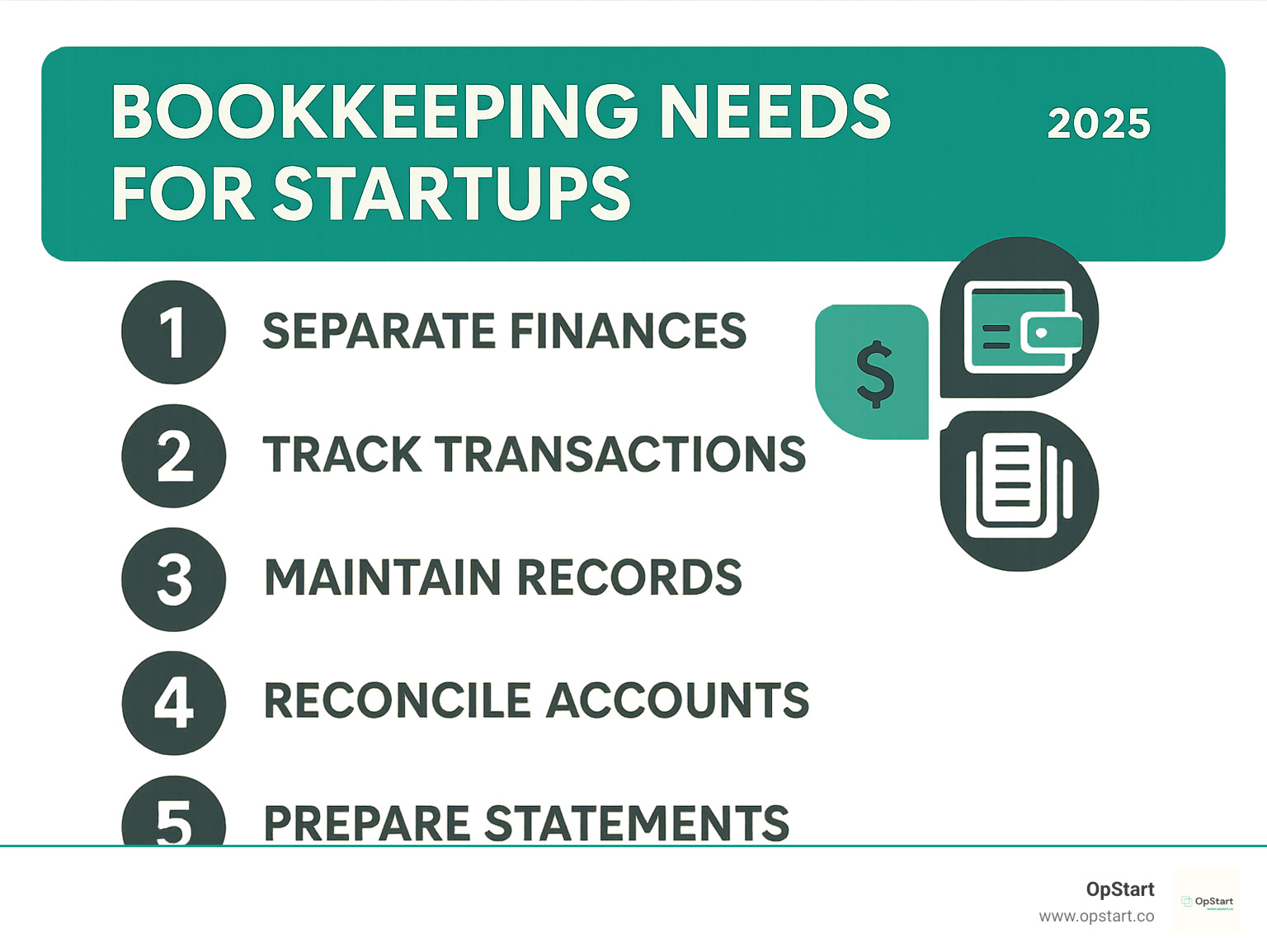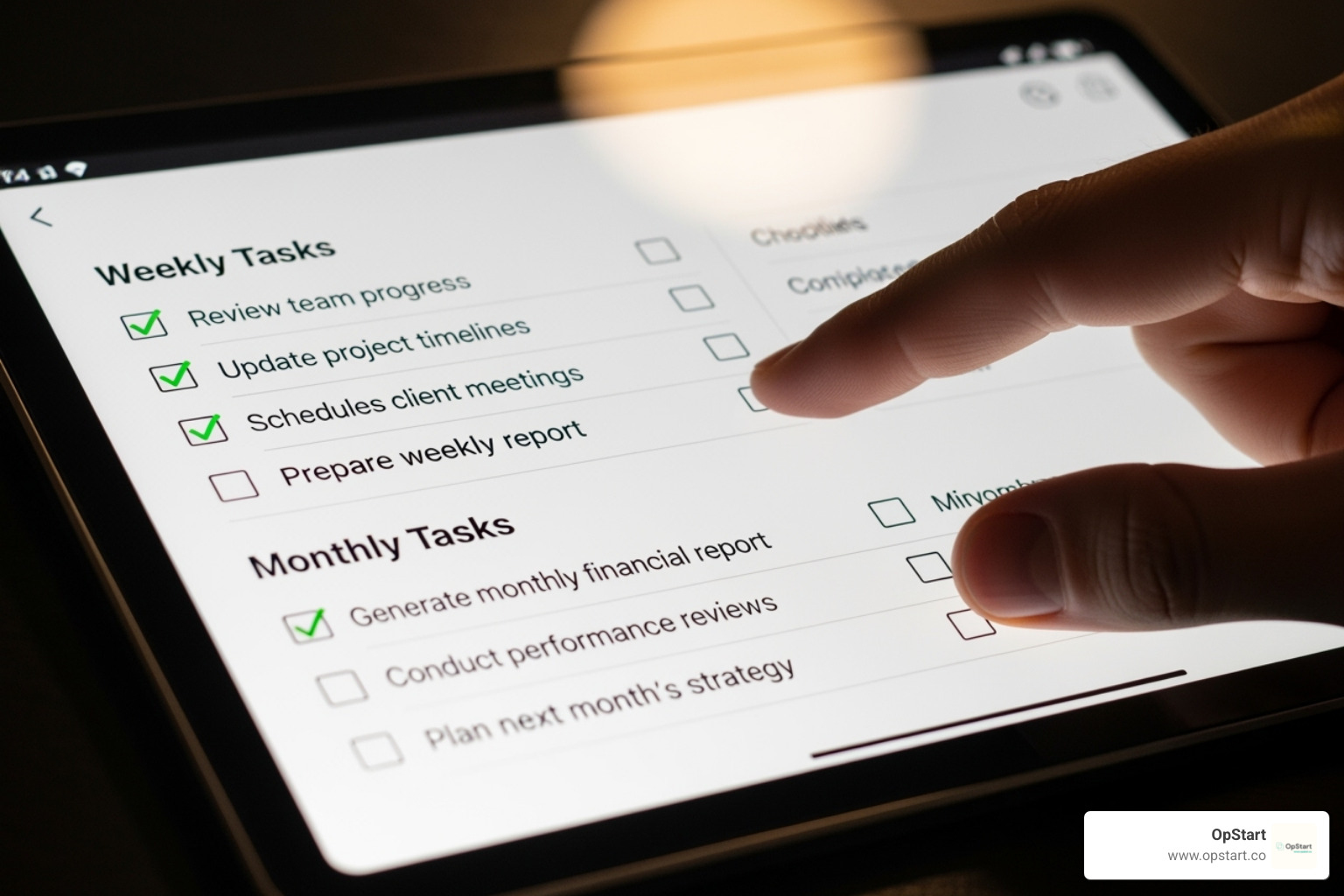Why Proper Bookkeeping is Your Startup’s Secret Growth Engine
Bookkeeping needs for start ups are more than record-keeping; they’re the foundation that separates thriving companies from the 50% of startups that fail within five years due to cash flow issues.
Essential bookkeeping for startups includes:
- Separating business and personal finances.
- Tracking every transaction with accounting software.
- Maintaining key financial records like receipts and invoices.
- Performing monthly bank reconciliations.
- Preparing financial statements (Income Statement, Balance Sheet, Cash Flow).
- Staying tax compliant and managing deadlines.
- Monitoring cash runway and burn rate.
- Keeping investor-ready books.
As one founder noted during a funding round: “We thought that the online store we opened last year made a profit. Yet with hundreds of different business expenses, we weren’t sure which qualified as tax deductions.” This confusion is common but preventable with a solid bookkeeping foundation.
Good bookkeeping transforms financial confusion into clarity, empowering you to make informed decisions, attract investors, and scale with confidence. Without it, you’re flying blind.
I’m Maurina Venturelli, and I’ve helped take companies from startup to IPO. At OpStart, I’ve seen how meeting the bookkeeping needs for start ups becomes the backbone of successful fundraising and strategic growth.

Setting the Financial Foundation: Your First Bookkeeping Steps
Amid the excitement of a new business, it’s easy to overlook financial management. But setting up a solid financial foundation from day one will save you headaches, potential audits, and sleepless nights down the road.
First, separate your business and personal finances immediately by opening a dedicated business bank account and credit card. Mixing funds is a common mistake that leads to IRS scrutiny and makes tracking expenses a nightmare. Once separate, choose an accounting system (a spreadsheet to start, or dedicated software) and begin categorizing every dollar in and out of your business using a Chart of Accounts. Consistency is key.
Bookkeeping vs. Accounting: What’s the Difference?
While often used interchangeably, bookkeeping and accounting are distinct but equally crucial.
Bookkeeping is the daily process of recording and organizing all financial transactions, such as sales, expenses, and payments. It’s the meticulous data entry that creates your financial records.
Accounting involves interpreting, analyzing, and reporting on those records. It’s the strategic side: preparing financial statements, analyzing performance, and ensuring tax compliance. Accounting turns raw data into actionable intelligence.
Bookkeeping builds the financial library; accounting reads the story those books tell. To learn more, see our guide: Fractional CFO vs. Bookkeeper vs. CPA: What’s the Difference?
Choosing Your Accounting Method
You must choose between two accounting methods: cash or accrual basis.
- Cash Basis Accounting: Records revenue when cash is received and expenses when cash is paid. It’s simpler and often used by very small businesses.
- Accrual Basis Accounting: Records revenue when it’s earned and expenses when they’re incurred, regardless of when cash changes hands. This provides a more accurate picture of your company’s financial health.
While cash basis is simpler, accrual accounting is preferred for growing startups, especially those seeking funding. Investors expect financial statements prepared using Generally Accepted Accounting Principles (GAAP), which aligns with the accrual method. For a deeper dive, explore our article: Cash vs. Accrual Accounting
The Essential Records Every Startup Must Keep
Keeping meticulous records is a legal requirement and protects you during an audit. Here’s what your startup must keep:
- Bank and Credit Card Statements
- Invoices (sent and received)
- Receipts for every expense. Use an app to digitize them.
- Payroll Records for all employees.
- Legal Documents (incorporation, contracts, permits).
- Tax Returns (federal, state, and local).
- Financial Statements (Income Statement, Balance Sheet, Cash Flow).
- Loan Documents
- W2 and 1099 Forms
We recommend keeping most financial records for at least three years, per IRS guidelines on record keeping. Some documents, like legal filings, should be kept indefinitely. It’s better to be safe than sorry, as the IRS can extend the retention period if they suspect underreported income.
The Startup Bookkeeping Playbook: Key Tasks and Best Practices
Once your foundation is set, establish a routine. Bookkeeping is an ongoing process requiring consistency and accuracy. Think of it as financial hygiene—regular maintenance prevents major problems later.

Your Weekly and Monthly Bookkeeping Checklist
A regular rhythm for your bookkeeping needs for start ups ensures accuracy, helps manage cash flow, and simplifies tax season.
Weekly Tasks:
- Enter and categorize all transactions. Use accounting software to automate this by linking your bank accounts.
- Digitize receipts. Use an app or snap photos and upload them to cloud storage to prevent losing them.
Monthly Tasks:
- Perform bank reconciliation. Compare your bank statements to your accounting records to catch errors and confirm accuracy. This is non-negotiable.
- Send invoices and pay bills. Prompt invoicing improves cash flow, while timely payments maintain good vendor relationships.
- Review outstanding invoices. Follow up on unpaid invoices to ensure you get paid.
- Review your financial standing. Look at your Income Statement and Balance Sheet for a quick snapshot of your business’s health.
Common (and Costly) Bookkeeping Mistakes to Avoid
Startups often fall into common bookkeeping traps. Avoiding them can save you time, money, and stress.
- Mixing personal and business finances. This is the top mistake. It complicates taxes and deters investors. Keep funds separate.
- Procrastination. Putting off bookkeeping leads to a mountain of work, increasing the risk of errors and making tax season painful.
- Misclassifying expenses. Incorrect categorization can lead to missed tax deductions and raise red flags during an audit. When in doubt, consult an accountant.
- Ignoring revenue recognition. For accrual accounting, understanding when to recognize revenue is critical for an accurate financial picture.
- Not backing up data. Ensure your financial data is regularly backed up. Cloud-based software usually handles this automatically, a huge plus for your bookkeeping needs for start ups.
- Using spreadsheets for too long. Spreadsheets are not scalable, are prone to manual errors, and lack the automation of dedicated software.
- Neglecting bank reconciliation. Failing to reconcile accounts monthly allows errors and discrepancies to go unnoticed.
- Not tracking vendor invoices. Without careful tracking, you might pay a bill twice or miss out on discounts.
If these mistakes sound familiar, it might be time to reconsider your approach. Check out our guide: Is Your Bookkeeping Good Enough?
Beyond the Books: Using Financial Data for Strategic Growth
Your diligently recorded transactions are more than just numbers; they are the raw material for strategic decisions. Good bookkeeping creates a map of your business, showing where you’re thriving and where you’re struggling. This financial data is your compass for navigating daily operations and major funding rounds.
How Financial Statements Guide Your Startup’s Strategy
Your financial statements tell you what’s working, what’s not, and what to focus on next.

-
The Profit & Loss (P&L) Statement is your performance report card, showing if you’re making money. It reveals your most profitable products and helps you assess marketing ROI. Learn more in our guide: How to Read a Profit & Loss Statement.
-
The Balance Sheet provides a snapshot of your company’s financial health, showing your assets, liabilities, and equity. It’s crucial when discussing your company’s value with investors. Dive deeper with: How to Read a Balance Sheet.
-
The Cash Flow Statement is arguably your most important tool. It tracks all cash moving in and out, helping you calculate your runway (how long your money will last) and burn rate (how fast you’re spending it). Master it here: How to Read a Cash Flow Statement.
Understanding all three statements helps you make smarter decisions about hiring, product development, and growth investments.
Staying Compliant and Managing Startup Taxes
Staying compliant is non-negotiable, and proper bookkeeping makes tax season manageable. Your startup faces several tax obligations—including sales tax, payroll tax, and income tax—that accurate records help you handle smoothly.
The real benefit is maximizing your deductions. Every properly documented business expense can reduce your tax burden. For venture-backed startups, R&D tax credits can provide significant savings. With current books, meeting tax deadlines is easier, helping you avoid penalties and stress. For more guidance, see our resource: Taxes for Startups.
Fueling Growth: Bookkeeping for Funding and Investor Relations
When raising capital, your financial records are your credibility. Clean, accurate books signal that you’re a serious, professional operation.
- Investor trust starts with financial transparency. Messy records suggest poor management and can derail funding conversations.
- Financial projections carry more weight when based on solid historical data. Investors want to see that your assumptions are grounded in reality.
- Due diligence readiness is key. Investors will examine your records with a microscope. Clean books prevent delays and can save a deal.
- Cap table management becomes easier with proper financial systems as you track equity ownership across investment rounds.
Professional bookkeeping demonstrates you’re ready to scale. Learn more: Startup Accounting Services: What Founders Need to Know.
Choosing Your Path: DIY, Software, and Professional Bookkeeping Needs for Start Ups
You know bookkeeping matters, but who will do it? The answer depends on your startup’s stage, budget, and complexity. The goal is to find the right balance of cost, accuracy, and founder focus, choosing a path that scales with your growth.

The DIY Approach: When to Manage Your Own Books
Handling your own books saves money on professional fees, but it’s a significant time commitment. As a founder, your time is your most valuable resource, and you’re more likely to make costly mistakes without proper training.
DIY works best when you’re a pre-seed startup with very low transaction volume and more time than money. However, plan to switch to a more robust solution as soon as you can afford it. Your energy is better spent on growing your business.
Essential Software and Tools for Startups
Whether DIY or outsourced, the right software stack is crucial. Modern tools automate tedious tasks and provide real-time financial insights.
- Accounting Software: Platforms like QuickBooks Online, Xero, or the free option Wave are your foundation. They connect to bank accounts, categorize transactions, and generate reports.
- Supporting Tools: Expense tracking tools (Expensify), bill pay systems (Bill.com), and payroll services (Gusto) integrate with your accounting software to create a seamless flow of financial data.
We strongly recommend moving away from spreadsheets as quickly as possible. They are prone to errors, don’t scale, and lack the automation that makes modern bookkeeping manageable.
Outsourcing: When to Hire Professional Help for Your Startup’s Bookkeeping Needs
For most growing startups, outsourcing bookkeeping is a smart move. It ensures accuracy, saves you time, and provides strategic insights.
Signs you’re ready to outsource include:
- Spending more than a few hours a week on bookkeeping.
- Preparing to raise capital (investors expect clean, GAAP-compliant books).
- Increasing financial complexity (multiple revenue streams, payroll, inventory).
Professional bookkeeping often pays for itself through improved accuracy, tax savings, and the time it frees up for you to focus on revenue-generating activities. As we explore in detail: 8 Ways a Great Bookkeeper Pays for Themselves.
Your bookkeeping needs for start ups will evolve. Plan ahead and choose solutions that can scale with your ambitions.
Frequently Asked Questions about Startup Bookkeeping
It’s normal to have questions about managing your startup’s finances. Here are answers to some of the most common inquiries about the bookkeeping needs for start ups.
How much should a startup spend on bookkeeping?
The cost depends on your business complexity and the approach you take.
- DIY: The direct cost is low (software fees of $20-$100/month), but the opportunity cost of your time is high, as is the risk of errors.
- Outsourced Services: Basic bookkeeping can start around $100-$500 per month. For venture-backed startups with more complex needs, comprehensive services can range from $1,000 to several thousand dollars per month.
Think of good bookkeeping as an investment, not an expense. The value it brings in accuracy, tax savings, and strategic insight often far outweighs the cost.
What are the most critical bookkeeping needs for start ups in their first year?
In your first year, focus on these foundational tasks:
- Separate business and personal finances with dedicated bank accounts.
- Track every single transaction from day one.
- Choose an accounting method (cash vs. accrual) and system (software is best).
- Establish a monthly review process, including bank reconciliations and reviewing financial statements.
- Stay tax compliant by understanding your obligations and tracking expenses for deductions.
Getting these basics right will prevent future headaches and set you up for sustainable growth.
Can I use a spreadsheet for my startup’s bookkeeping?
You can use a spreadsheet in the very beginning, but it’s not recommended for any startup aiming for growth. Spreadsheets are highly prone to errors, lack scalability, and require hours of manual data entry.
They also offer limited reporting capabilities and pose security risks compared to robust software. For accuracy, efficiency, and peace of mind, investing in dedicated accounting software is a smart move that pays for itself as you scale.
Conclusion: Scale with Financial Confidence
The journey from startup idea to a thriving business is challenging. The most successful founders don’t just build great products; they build on a rock-solid financial foundation. Your bookkeeping needs for start ups aren’t just about compliance—they’re your strategic superpower.
Good bookkeeping transforms messy data into clear insights, helping you steer challenges and make decisions that propel your business forward. By managing your books consistently, you’ll be ready for investor conversations, confident during tax season, and always aware of your financial runway. It’s about turning tedious tasks into a powerful engine for growth.
Your focus should be on innovating, building, and connecting with customers. At OpStart, we’re passionate about taking the financial heavy lifting off your plate. We provide expert-managed financial operations, giving you the freedom to dedicate your time and energy to what you do best: growing your company.
Don’t let financial worries slow you down. Accept confident financial management and scale with peace of mind.


